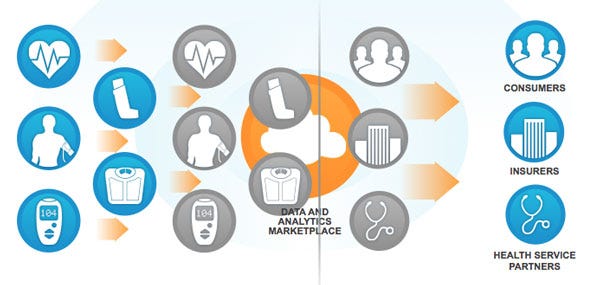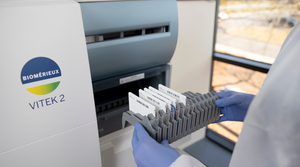What Qualcomm Has in Common with Google and Microsoft
December 3, 2013
The information technology world was dominated by Microsoft, then Google, and perhaps Apple or Facebook or something else next. So is Qualcomm trying to do the same with healthcare--an industry worth $6.5 trillion, according to an estimate from the Emergo Group?
There seemed to be a great deal of talk on Tuesday of Qualcomm taking over the nuts and bolts of the digital health revolution during a presentation by Qualcomm Life's senior vice president Rick Valencia.
Speaking in the Wireless Medical Devices West conference portion of BIOMEDevice San Jose, Valencia said digital and mobile health are the future of health care.
"Our belief is that one day, the smartphones will be a medical device," Valencia says.
More people globally have access to mobile technology than running water or electricity and the technology can be leveraged to address key challenges such as a shortage of caregivers and the explosion of chronic diseases. The smartphone has become the "remote control of our lives," Valencia said, asking the audience to ponder how many industries have been disrupted by the platform.
| "The future is 'ubiquitous connectivity,' which will become a human standard, where all devices in the Internet of Everything will communicate to improve our lives like never before." -- Rick Valencia, Qualcomm Life senior vice president |
Valencia described how San Diego-based Qualcomm is essentially playing a role in almost every piece of that revolution, and helping to shift a significant share of healthcare away from the expensive acute care environment in the process.
Here are some of the pieces of the puzzle that Qualcomm is all over right now:
Channeling all that medical device data through one channel. To help make that vision a reality, Qualcomm Life introduced its 2net platform in 2011. Designed to help capture and transport data, the 2net system can be used with Class I, II, and III medical devices. The 2net cloud-based platform has grown from 40 to more than 250 device manufacturers and other companies in technology roughly one and a half years.
Qualcomm Life recently expanded the functionality of the platform with the introduction of 2net Mobile, a service that aggregates medical data from various medical sensors into a single channel. 2net Mobile works on an array of smart devices and complies with HIPAA specifications.
Storing the data in the cloud. The platform also serves as a channel for healthcare data to the cloud. As a growing number of patients store private health data in the cloud. Medical devices will increasingly interface with the cloud and will leverage mobile platforms to do so. This functionality is also attractive to facilities like hospitals, which are looking to use the cloud technology to purchase supplies and medications.
|
The 2net cloud-based platform helps enable what Valencia terms "the healthcare superhighway," which spans consumers, payers, and clinicians. |
Becoming the data middleman. Valencia explained that the company's Healthy Circles platform helps present the data to relevant healthcare partners. "It is middleware that is initiated by the provider, and it basically enables the data to flow to the entire care team and also capture data from the lab and pharmaceutical side," Valencia explains, adding that it is another technology that helps shift healthcare from outside of the acute care setting. The service uses multi-variable analytics to help capture data, which is anonymized.
Turning mobile devices into medical devices. Mobile devices provides a user interface for people's lives, Valencia said. They also provide a unique architecture to innovators: They are always connected, always on and updated, power efficient, and can scale broadly.
In the healthcare realm technologies such as body area networks (BANs) and near-field communication are complementing mobile platforms and offering solid growth opportunities for healthcare. At present, however, only 5% of consumer medical devices have wireless functionality. That figure may increase quickly as mobile technology gets smarter and is used more broadly to transmit bi-directional intelligence and insights wirelessly in real time.
And don't forget Google Glass. Also promising for healthcare are brand new technologies like Google Glass. To help accelerate innovation in this space, Qualcomm Life is partnering with Palomar Health to help foster the development of medical apps for Google Glass and other heads-up-display-style technologies. Palomar Health is a veritable "hospital of the future," according to Valencia, and will serve as a living laboratory for testing new technologies.
The company wants to help spur innovation in the field of medical informatics related to the study of in vivo, ex vivo, and in silico applications for Google Glass, smart watches, and sensors. "The incubator invites innovators who want to experiment with Glass and related technologies and gives them access to EMR data," Valencia says. "We have seen a couple of very early-stage prototypes using Google Glass that are pretty interesting to give the doctor information in real time." According to Valencia, Palomar Health has been overwhelmed with interest in Glassomics, the incubator pushing medical applications of Google Glass.
Here's how Valencia summed it up. "Every other industry has benefitted from digitizing their information, but healthcare is still a long ways away from that. ... In the future, technology will enable you to track your healthcare using sensors without having to be in front of your doctor. The future is 'ubiquitous connectivity,' which will become a human standard, where all devices in the Internet of Everything will communicate to improve our lives like never before."
And if Qualcomm has its way, a lot of the communicating will be taking place over its technology.
Brian Buntz is the editor-in-chief of MPMN. Follow him on Twitter at @brian_buntz and Google+.
About the Author(s)
You May Also Like



